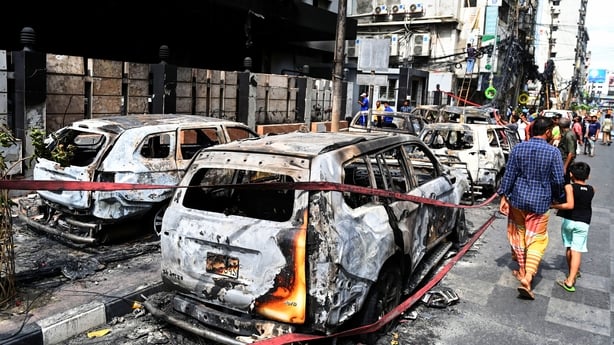Soldiers are patrolling Bangladeshi cities to quell growing civil unrest sparked by student demonstrations, with riot police firing on protesters who defied a government curfew.
This week's violence has killed at least 123 people so far, according to an AFP count of victims reported by police and hospitals, and poses a monumental challenge to Prime Minister Sheikh Hasina's autocratic government after 15 years in office.
A government curfew went into effect at midnight and the premier's office asked the military to deploy troops after police again failed to subdue widespread mayhem.
"The army has been deployed nationwide to control the law and order situation," armed forces spokesman Shahdat Hossain said.
We need your consent to load this rte-player contentWe use rte-player to manage extra content that can set cookies on your device and collect data about your activity. Please review their details and accept them to load the content.Manage Preferences
The curfew will remain in effect until at least 10am local time tomorrow, private broadcaster Channel 24 reported.
Streets of the capital Dhaka were almost deserted at daybreak, with troops on foot and in armoured personnel carriers patrolling the sprawling megacity of 20 million.
Thousands returned to the streets later in the day in the residential neighbourhood of Rampura, with police firing live rounds at the crowd and wounding at least one person.
"Our backs are to the wall," protester Nazrul Islam, 52, said at the scene.
"There's anarchy going on in the country…they are shooting at people like birds."
Hospitals have reported a growing number of gunshot deaths since Thursday.
"Hundreds of thousands of people" had battled police across the capital yesterday, police spokesman Faruk Hossain said.
"At least 150 police officers were admitted to hospital. Another 150 were given first aid treatment," he said, adding that two officers had been beaten to death.
"The protesters torched many police booths... Many government offices were torched and vandalised."
A spokesman for Students Against Discrimination, the main group organising the protests, said that two of its leaders had been arrested.

A second senior official from the main opposition Bangladesh Nationalist Party (BNP) was arrested in the early hours, party spokesman Sairul Islam Khan said.
Sheikh Hasina had been due to leave the country on Sunday for a planned diplomatic tour but abandoned her plans after a week of escalating violence.
"She has cancelled her Spain and Brazil tours due to the prevailing situation, her press secretary Nayeemul Islam Khan said.
Near-daily marches this month have called for an end to a quota system that reserves more than half of civil service posts for specific groups, including children of veterans from the country's 1971 liberation war against Pakistan.
Critics say the scheme benefits children of pro-government groups that back Ms Hasina, 76, who has ruled the country since 2009 and won her fourth consecutive election in January after a vote without genuine opposition.
Sheikh Hasina's government is accused by rights groups of misusing state institutions to entrench its hold on power and stamp out dissent, including by the extrajudicial killing of opposition activists.
Since the first deaths on Tuesday, protesters have begun demanding Ms Hasina leave office.
"It's not about the rights of the students anymore," business owner Hasibul Sheikh, 24, said at the scene of the Rampura protest.
"We are here as the general public now," he added. "Our demand is one point now, and that's the resignation of the government."
Pierre Prakash of Crisis Group said he lack of competitive elections since Ms Hasina took office had led to mounting public frustration.
"With no real alternative at the ballot box, discontented Bangladeshis have few options besides street protests to make their voices heard," he said.
Hospitals and police reported an additional ten deaths from clashes yesterday, with 105 other deaths reported since Tuesday.
Police fire was the cause of more than half of the deaths reported so far this week, based on descriptions given to journalists by hospital staff.
"The rising death toll is a shocking indictment of the absolute intolerance shown by the Bangladeshi authorities to protest and dissent," Babu Ram Pant of Amnesty International said in a statement.
Authorities imposed a nationwide internet shutdown on Thursday which remains in effect, severely hampering communication in and out of Bangladesh.
Government websites remain offline and major newspapers including the Dhaka Tribune and Daily Star have been unable to update their social media platforms since Thursday.
Bangladesh Television, the state broadcaster, also remains offline after its Dhaka headquarters was set on fire by protesters the same day.

